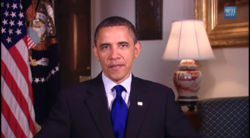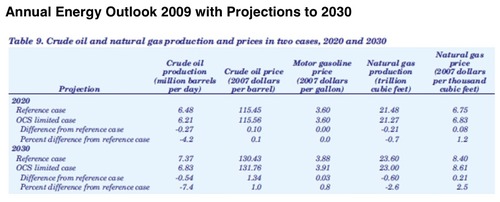President Obama promotes myth about offshore drilling and gas prices
 With Congress taking action in recent weeks to expand and speed up offshore oil and gas drilling, President Obama used his weekly radio address this past Saturday to weigh in on the matter.
With Congress taking action in recent weeks to expand and speed up offshore oil and gas drilling, President Obama used his weekly radio address this past Saturday to weigh in on the matter.Unfortunately, he used his platform to promote a persistent myth about expanded offshore drilling: that it would bring down prices at the gas pump.
Obama opened his address by talking about how the economy is improving but acknowledged that too many Americans are still struggling to pay their bills amid rising costs.
"Without a doubt, one of the biggest burdens over the past few months has been the price of gasoline," the president said, noting that a gallon costs over $4 in some places.
Obama then outlined a number of ways his administration plans to address the problem. They include the creation of a task force led by Attorney General Eric Holder that will root out cases of fraud or manipulation in the oil market. There's growing concern about speculators driving up the cost of crude, with Goldman Sachs recently estimating that speculation may be boosting oil prices by as much as $27 a barrel -- about a fifth of the total price.
President Obama didn't stop there, though: He went on to call for increasing domestic oil production. To that end, he said he would direct the Department of Interior to conduct lease sales in Alaska's National Petroleum Reserve and to speed up evaluation of oil and gas resources off the mid- and south Atlantic coasts and in new areas of the Gulf of Mexico.
This is not a new policy for Obama, who first announced last spring that he would allow drilling in the Atlantic from Maryland to northern Florida, and in the eastern Gulf near Alabama. But it's one of the most explicit efforts by Obama to link the drilling expansion to lower gas prices.
However, the president's own energy analysts say that expanded drilling will not bring Americans any relief at the pump.
In 2009, the U.S. Energy Information Administration looked at the difference between two scenarios: one involving full offshore drilling, and the other only restricted offshore drilling. Its analysis found there would be no impact on gasoline prices from full drilling in 2020 -- and only a slight impact by 2030, with gas prices falling by a mere three cents a gallon.
In the following EIA chart based on that analysis, "reference case" refers to full offshore drilling, while "OCS limited case" refers to restricted drilling on the Outer Continental Shelf:

Meanwhile, the EIA analysis does not take into account what's at risk from drilling off the coasts of Virginia, the Carolinas, Georgia and Alabama -- tourism- and fishing-dependent areas second only to the Central Gulf as the most environmentally sensitive to oil spills due to their extensive coastal wetlands.
Drilling there carries considerable risk for a very small potential benefit, as the federal government has estimated the entire Atlantic Coast is likely to yield 3.8 billion barrels of crude oil -- an amount that would be tapped out in only six months at current rates of U.S. gasoline consumption.
Not surprisingly, environmentalists reacted to Obama's speech with disappointment. Sierra Club Executive Director Michael Brune called on the administration to avoid "opening us up for a repeat of the BP disaster" by promoting smarter transportation choices and more fuel-efficient vehicles instead of expanded drilling.
But Big Oil wasn't exactly enthusiastic, either: In a statement released after the president's address, the American Petroleum Institute called on Obama to go even further on drilling.
"The president has acknowledged the need to increase environmentally sound oil production here in the United States," said API Upstream Director Erik Milito. "While this is a step forward for the national discourse on America's energy future, we hope that these proposals are only the first in a series towards a more robust national energy plan."
API called for access to shale reserves and other U.S. areas currently off limits for drilling, as well as for building the controversial proposed oil sands pipeline to import more crude from Canada.
Tags
Sue Sturgis
Sue is the former editorial director of Facing South and the Institute for Southern Studies.
